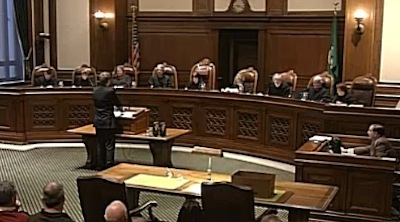
The Washington State Supreme Court listens to oral arguments in March in the case of Stephen C. Johnson. / Courtesy image from TVW
By Sharyn L. Decker
Lewis County Sirens news reporter
CHEHALIS – A Lewis County case which could have eliminated an enormous part of the state’s system of driver’s license suspension has ended without that result.
In a five to four decision, the Washington State Supreme Court upheld a Lewis County man’s conviction for driving while license suspended in the third degree.
The court declined to address Stephen C. Johnson’s attorneys’ claim of “driving while poor” concluding Johnson wasn’t poor enough in the right way to have standing to make the challenge.
However, the nine justices did decide Johnson was poor enough he should have been entitled to appointed counsel for his appeal. The case was remanded to Lewis County District Court to address that issue.
The case was argued to the Supreme Court last March by Olympia attorney Kevin Hochhalter and Lewis County Deputy Prosecuting Attorney Shane O’Rourke. It’s opinion was issued on Thursday.
Johnson appealed the conviction on two grounds, first, his attorneys argued the DWLS 3rd statute did not actually forbid his continued driving, in his particular case, after he contested and lost his 2007 civil infraction for driving with an expired license.
He was fined $260, he did not pay and the court notified the state Department of Licensing he failed to pay, so they suspended his license. His arrest for DWLS 3rd – a criminal misdemeanor – came in September 2008 when a Lewis County sheriff’s deputy spotted his truck driving without a rear bumper or mud flaps and pulled him over.
Johnson contended that because the notice of infraction did not expressly require him to pay a fine, he had not violated its terms. The majority of the court disagreed with him.
In a nine-page dissent authored by Justice Charles K. Wiggins, he and the remaining members of the court however, sided with Johnson’s lawyers on that point.
On the second aspect of Johnson’s appeal, his lawyers argued that because he is indigent, the suspension was invalid under the Fourteenth Amendment to to the United States Constitution’s due process and equal protection clauses.
But that argument, that the state or the court should have but didn’t inquire about his ability to pay the $260 infraction – before sending off notice to DOL – simply did not get examined by the Supreme Court.
The Lewis County man may be poor, but he had assets, according to the court.
In the record was his testimony he had no income and had not worked for 30 years, but owned a $300,000 home free and clear.
The court said Johnson could have borrowed money to pay the original traffic fine.
Since he didn’t meet the necessary definition for indigence, the full court agreed, he didn’t have standing to challenge the suspension on that basis.
Finally, however, for the purposes of qualifying for a court-appointed lawyer for his appeal, Johnson should have been found indigent, the court said.
Under Washington state statute he met its requirements in that he received state aid in the form of food stamps and energy assistance, the court wrote.
The Supreme Court ordered Lewis County District Court to enter an order designating Johnson indigent, or indigent and able to contribute, and if the latter, then determine the costs he should bear for his appeal.
•••
For background, read the decision here.
Watch and listen to appeals attorney Kevin Hochhalter and Lewis County Deputy Prosecuting Attorney Shane O’Rourke address the court in March, here
 Join us
Join us